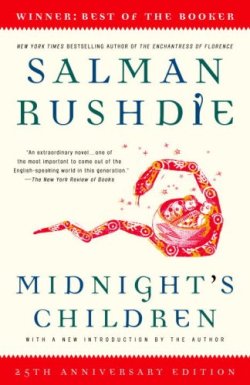For my fourth act, I read Salman Rushdie’s Midnight’s Children. 
When you study literature Rushdie’s works come up a lot in discussion. And yet, I made it through an English undergraduate program without ever being assigned one novel or short story by Salman Rushdie. In my graduate studies in International Relations, his name came up quite a bit too because of my focus on the Middle East. But no Rushdie reading assignment there either. Of course, when a professor would ever mention Rushdie in my undergraduate or graduate courses my classmates would nod their heads. I would too. We all knew who he was. But had we read his stuff? Maybe my peers had. I had not. So, I picked up Midnight’s Children, admired the cover, and dove in. It was March 30th.
And now it is May 12th. What exactly happened between the aforementioned dates, pardon me, between the covers of the book, I am not entirely sure. But I am not too worried about that because a major theme of the book is the unreliability of Saleem’s narrative. He reminds you again and again that this may not be the way things happened exactly, but it is how he is remembering them at this precise moment. Padma (Saleem’s future wife) reminds Saleem of his story’s inaccuracies as well whenever he has screwed up the date of a significant event, such as Gandhi’s assassination.
Saleem’s story starts long before his birth, with the telling of how his grandfather met his wife, but the story really picks up when Saleem is born at exactly midnight on August 15, 1947, the day India became an independent country. All the babies born in India during its first hour of existence end up acquiring special powers. One of them can time travel. Another is a powerful witch. Saleem, being born at the precise moment India was born, is the most powerful. He can read people’s minds. And he can feel the presence of all those born that fateful night, the young ones known as Midnight’s Children. He can read minds from afar and explore the memories of anyone he wishes.
Eventually, Saleem loses that gift, but acquires another, the ability to smell nearly everything, from love to the exact scent of every human he has ever come into contact with. Over 533 pages, his story unfolds like that of Forrest Gump. Saleem is intimately involved with his country’s dealings for much of the book. Finally, he catches up to his 31-year-old self who is telling the story, only to close the novel (spoiler alert) with the prediction of his own death on the day he turns 32.
Saleem’s journey is epic. There is no point in sharing the entirety of it here or ever, really. I would feel different, I think, if I had loved the book. But this book, which might be the heaviest lifting I will do throughout this New Year’s resolution of mine, was one of the most confusing books I have ever read. Perhaps, the most confusing book that I have ever finished. For most of the book, I consulted chapter summaries on Spark Notes. Of course, I read the chapter first and only then would I read Spark Notes. It was a rough start, having no idea what really happened after I finished the very first chapter. In my defense, it was late afternoon, I was sitting outside in the sun, and London was napping. But I had my coffee? It didn’t matter. In fact, coffee can’t really help you through this book. But Spark Notes did, so I actually felt a connection to the story from time to time.
The thing about Midnight’s Children is that it is damn respectable for the quality of the writing. The style is unbelievable. Rushdie’s vocabulary is astonishing and there are sentences that flow so well I read them a few times for the sheer delight in their finely-tuned form. The book won the Booker prize in 1981. And then, for the 40th anniversary of the Booker prize, it was voted Best of the Booker, the best novel to have won that prize in 40 years. That is one huge honor, which certainly played a role in my selection of this particular work of Rushdie’s. I have got to read such an acclaimed book.
I did. It did not live up to what I would expect for the Best of the Booker award, but the book will certainly stick with me for a while. And now, when a professor mentions Rushdie’s name I can nod my head without feeling like such a dolt.